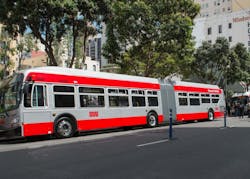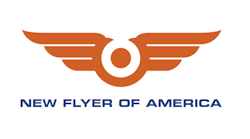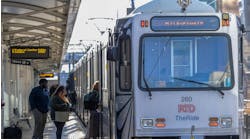Now Arriving: Muni’s New Buses of the Future
The San Francisco Municipal Transportation Agency (SFMTA) has taken delivery of its first New Flyer Industries electric trolley and biodiesel-electric hybrid buses. These two buses represent the next phase of upgrades for SFMTA’s aging vehicle fleet. Sixty brand new electric trolley buses will replace buses that have been in operation for over two decades. Concurrently, through unanimous board of supervisors approval, the SFMTA has purchased 61 new biodiesel-electric hybrid buses. The combined purchases are part of the agency’s five year plan to replace the entire bus fleet.
The introduction of the new low-floor biodiesel hybrid and electric trolley busses coincides with this year’s celebration of Earth Day. The new hybrids will run on B20: a blend of diesel and biodiesel, which is made from recycled oil and fat. The new trolleys will operate on 100 percent hydro-electric power. All of our electricity is hydropower – supplied from the Hetch Hetchy Reservoir and is carbon neutral. Muni now has one of the most diverse transit fleets in the world and is also the cleanest multimodal fleet in California.
“New 21st century buses are the very cornerstone of San Francisco’s Transit-First policy, making sure Muni is reliable, affordable and safe for our riders,” said Mayor Edwin M. Lee. “The purchase of a new state-of-the-art fleet of electric trolley and hybrid buses, which reduce or eliminate greenhouse gas emissions, helps San Francisco lead the way to a sustainable future. By offering real solutions to fighting climate change, we can meet the needs of our thriving economy and growing population.”
Reliability was the impetus for the newly launched Muni Forward initiative. Muni transports more than 700,000 people during a normal weekday and the majority of those daily trips are taken by bus. So Muni Forward’s aim is to prioritize the bus routes that are the workhorses of our transit system, identifying time of day to enhance frequency and extend service hours on Express routes. The cumulative result is more service and less crowding on several major routes.
“Right now bus breakdowns account for an astounding 40 percent of Muni’s delays, affecting thousands of riders,” said SFMTA Board Chairman Tom Nolan. “It’s because many of our buses are already past their useful life. Improving performance and reliability has been a primary goal of the Board, and this procurement readies Muni to be able to deliver better service to customers.”
This sweeping overhaul of Muni’s bus fleet is made possible by a combination of funding. The electric trolley bus purchase is backed by federal, state, Proposition K funds, and other local support. The total purchase cost is $94,950,444. The biodiesel hybrid bus funds include but are not limited to: Federal Transit Administration grants, AB644 bridge tolls, Proposition K and Proposition B funds. The total purchase contract is $68 million.
“Both the biodiesel hybrid buses and electric trolleys allow San Franciscans who ride Muni to celebrate Earth Day every day,” said SFMTA Director of Transportation Ed Reiskin. “More than half of our vehicles run on clean, Hetch Hetchy electric power; our trolley coaches and light rail vehicles and our cable cars are all powered by electric motors, providing more than 125 million zero-emission passenger trips per day.”
The SFMTA has been given notice to proceed with the procurement of 200 standard (40-foot buses) and up to 163 articulated low-floor biodiesel-electric hybrid buses. The base order is for 61 buses; the remaining purchases would occur in phases over the next six years.
In an effort to reduce the time it takes to purchase and receive replacement electric trolley buses, the SFMTA collaborated on a competitive bid vehicle contract with King County Metro and New Flyer Inc. Under this agreement, the SFMTA seeks to procure 60 articulated trolley buses with an option to purchase 240 standard buses. The joint contract with King County would permit the purchase of 33 additional articulated trolley buses to aid in the effort to replace Muni’s entire fleet.
The new trolley bus is expected to go into revenue service within the next month. The articulated hybrid buses are still undergoing a standard evaluation by Muni Operations prior to acceptance of the vehicles.




